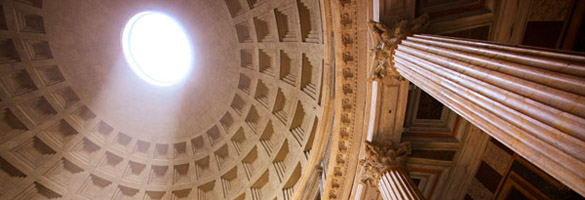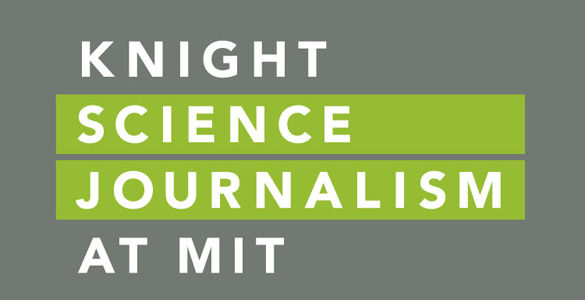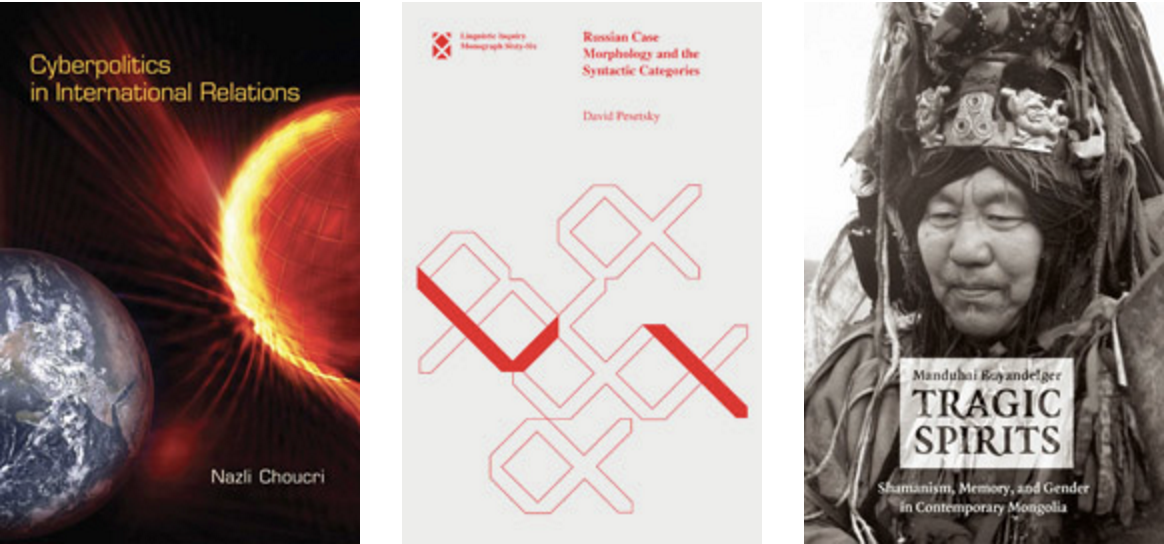
QUOTABLE
"The field of journalism plays a crucial role in helping
the public understand science. To get it right, journalists
need to get the science right, and then make it comprehensible
to the lay public. The Knight Science Journalism program at
MIT has been helping talented science journalists meet that
challenge for the past 30 years."
HONORS AND AWARDS
MUSIC
Keeril Makan's CD "Afterglow" named one of the 10 best classical recordings of 2013
TimeOut Magazine describes "Afterglow" as a "gripping collection of works by Boston-based composer Makan, whose music emphasizes color, timbre, sonority and space to rapturous effect." Makan is an Associate Professor of Music at MIT.
Listen to works from "Afterglow"

Keeril Makan, Associate Professor of Music, flanked by details from the cover of his new CD, Afterglow
POLITICAL SCIENCE
PhD student Ben Morse receives $80K research grant from the International Growth Center
Morse recieved the award in collaboration with two graduate students (from Emory and Yale) to run a research project on Security Sector Reform in Liberia. Morse is interested in the comparative political economy of development and quantitative methodology. Prior to MIT, he worked for Innovations for Poverty Action in New York, Mexico, and Liberia, and as an evaluation consultant for the Norwegian Refugee Council in Liberia.
Ben Morse profile | IGC
POLITICAL SCIENCE
Four awarded the Smith Richardson Foundation World Politics and Statecraft Fellowship
Congratulations to political science graduate students Brian Haggerty, Mark Bell, Noel Anderson, and Alec Worsnop. The Smith Richardson Fellowships support the research and writing of policy-relevant dissertations, with preference to projects that could directly inform U.S. policy debates and thinking.
More | Profiles: Brian Haggerty | Mark Bell | Noel Anderson | Alec Worsnop
FEATURE
SCIENCE JOURNALISM
Elevating the Discourse | The Knight Science Journalism Fellows at MIT
Science journalism is the central way many of us learn how advances in science and technology are affecting and changing our lives — in everything from daily choices about food or health care, to issues that impact the planet as a whole.
But crafting great science journalism is a formidable challenge. Science journalists must be schooled deeply in complex scientific and technological practices, theories, and information. They must have superb skills in writing, video, and other media that can convey the facts, import, and implications of new discoveries and data. They must be ace reporters, bringing critical thinking and hard questions to their investigations. They must have command of language that is both nuanced enough to do justice to intricate ideas, and clear and compelling enough to engage a broad public audience.
For the past 30 years, the Knight Science Journalism (KSJ) program at MIT, has been helping talented science journalists meet that challenge.
Story + Interviews

RESEARCH
Research Portfolio
Research is the engine for the School's capacity to help meet the world's great challenges. To name just a few areas of impact, MIT SHASS research helps alleviate poverty, safeguard elections, steer economies, understand the past and present, inform health policy, assess the impact of new technologies, understand human language, and create new forms at the juncture of art and science.
Research Portfolio
LINGUISTICS
New understanding of an important property of language | David Pesetsky
In Russian Case Morphologies and the Syntactic Categories (MIT Press, 2014), David Pesetsky, the Ferrari Ward Professor of Modern Languages and Linguistics at MIT, proposes a radical new view of case morphology, supported by a detailed investigation of some of the thorniest topics in Russian grammar.
About the book | 3 Questions wtih David Pesetsky
POLITICAL SCIENCE
The impact of democracy traditions in post-2001 Afghanistan | Fotini Christia
Christia, an Associate Professor of Political Science, writes, "Our results relay a solid piece of advice: if development actors want to empower communities to sustain change, they should think twice about creating new institutions when options exist to strengthen the accountability of existing institutions. While democratic institutions like elected councils can improve outcomes, reformers must first clarify these institutions' relationship with existing bodies."
Story | Christia webpage
ANTHROPOLOGY
The surprising story of Mongolian shamanism | Manduhai Buyandelger
Buyandelger, Associate Professor of Anthropolgy, finds that after Soviet domination, a rebirth of shamanism helped Mongolia rewrite its own history. “Shamanism is a historical memory for people who lost parts of their ancestral homeland, and who had been marginalized and politically oppressed,” says Buyandelger, It flourishes, she notes, where people have “no museums, no libraries, no cemeteries, no mausoleums. They don’t have anything to materialize their memories of the past.”
Story | Buyandelger webpage
INTERNATIONAL RELATIONS
Cyberpolitics and international relations theory, policy, and practice | Nazli Choucri
In her recent book, Cyberpolitics in International Relations, MIT Professor of Political Science Choucri gives "an imaginative, skillful integration of the key concerns of international relations and the burgeoning scholarship on new communication technologies. A timely book that reveals how digital media are reconfiguring many of the classic themes of international relations theory.”
About the book | Nazli Choucri Profile

Two of our intrepid professors conducting research in the field
L: Anthropologist Manduhai Buyandelger riding with nomadic shamans on the Mongolian steppe
R: Political scientist Fotini Christia interviewing tribal leaders in Afghanistan
MIT GAME LAB
Care to play with Einstein?
Check out "Open Relativity" from the MIT Game Lab, a research group of Comparative Media Studies/Writing. Modern games have brought the power of play to many endeavors — from entertainment to education, art to activism, science to socialization and more. The MIT Game Lab explores the potentials of play in all these relams, particularly as it is amplified by new technologies.
About Open Relativity
POLITICAL SCIENCE
Précis interview | Richard Nielsen
Q&A with Associate Professor of Political Science Richard Nielsen about his research merging statistics, language, and fieldwork, to study Middle East politics, as well as his thoughts on independent religious institutions in Egypt and the broader Middle East in the aftermath of the Arab Awakening.
Story
HEALTH CARE
Study shows emergency room usage rates by those with new Medicaid coverage
A unique study of Oregon’s citizens, co-authored by MIT Ford Professor of Economics Amy Finkelstein, sheds empirical light on the inner workings of health care in the U.S.
Story | Finkelstein webpage
WATER
Water, water everywhere: But is there enough to drink?
Franklin Fisher, the Carlton Professor of Economics emeritus gave the opening remarks at MIT’s first-ever Water Summit, organized by the student-run MIT Water Club. At the event, MIT experts addressed the challenges of supplying clean, safe water to a growing world population.
Story
MIT NEWS
Current SHASS research stories by the MIT News Office team
Archive of recent and past SHASS research and feature stories by the MIT News writers
More
FACULTY PUBLICATIONS
Bookshelf
The research of MIT's School of Humanities, Arts, and Social Sciences appears principally in the form of books and publications, and music and theater productions. These gems of the School provide new knowledge and analysis, innovation and insight, guidance for policy, and nourishment for lives.
Take a look

Recent books
L to R: Cyberpolitics in International Relations, by political scientist Nazli Choucri; Russian Case Morphologies and the Syntactic Categories by linguist David Pesetsky; Tragic Spirits, Shamanism, Memory, and Gender in Contemporary Mongolia, by anthropologist Manduhai Buyandelger.
RESOURCES
Introducing the MIT SHASS Online Publications Directory —
A convenient, one-page portal to all the print and online publications produced by the School's 20+ academic units, centers, and programs. From Audits of the Conventional Wisdom to Scope to LIT@MIT — these publications keep readers up-to-date on current research, news, community profiles, and commentaries in their respective fields.
Take a look
NEWS
HEALTH CARE
Gruber outlines key upcoming moments in Affordable Care Act rollout
Jonathan Gruber, the Ford Professor of Economics at MIT, weighs in on the health plan’s status as legislation becomes reality. The closely watched rollout of the Affordable Care Act, which provides health insurance for all U.S. citizens, will have at least three key mileposts in 2014.
Story | Gruber webpage
CENTER FOR INTERNATIONAL STUDIES
SHASS researcher Thomas Neff's idea has turned 22,000 warheads into electricity
Neff’s idea and dedication, along with great cooperation by the Russian and U.S. governments, led to this success. The NYTs writes that "Millions of idealists, from President Obama on down, have sought a world without nuclear weapons. Dr. Neff, who has done more than almost anyone to advance that goal... said the lesson of the story 'is that private citizens can actually do something.'”
Story at the New York Times | About Thomas Neff
POVERTY ALLEVIATION
Videos from the J-PAL@10 anniversary symposium
Online video collection of the presentations at the 10th anniversary event for the Abdul Latif Jameel Poverty Action Lab.
Video Collection | Archive: Story about the symposium

SOLVING INEQUALITY
"Ten Ways to Get Serious About Rising Inequality"
From point 4 of 10: "In a 2011 paper that sparked an interesting debate, Peter Diamond, Professor of Economics emeritus, and Emmanuel Saez of Berkeley [MIT PhD in Economics '99] argued that, based on the costs and benefits to society as a whole, [the top tax rate] should be set at seventy-three per cent—a bit below the level in the nineteen-fifties, but well above today's rate."
Article in The New Yorker
WORKFORCE ECONOMICS
Time to get creative about helping the unemployed back into the job market | David Autor
Research by MIT's David Autor vividly shows how the program has become permanent welfare for some, discouraging those with limited disabilities from reentering the workforce. Large numbers of work-capable Americans voluntarily exit the labor force to collect disability, while others spend years at home trying to qualify for the rolls — while their work skills atrophy, he writes.
Story at CNN | Autor webpage
DEMOCRATIC ELECTIONS
"American elections need help. Here’s how to make them better."
The Presidential Commission on Election Administration recently released its Report and Recommendations to improve the voting experience in the United States. The commission relied heavily upon the expertise of the nation’s top political scientists and election administration experts, including MIT Professor of Political Science Charles Stewart III.
Story in the Washington Post + Recommendations | Stewart webpage
MUSIC
Brava! Praise for new work by MIT composer Elena Ruehr
"Elena Ruehr's piece opens with a series of majestic, brightly colored chords in the brass, whose reappearance at various points delineates the piece’s architecture. Steady string figurations lay a groundwork as melodies unspool in the winds. The remarkable facet of the piece is the way motion and stillness work together: The music always seems to be moving ahead, yet the landscape, like O’Keeffe’s, remains the same. The brass playing was brilliant."
Story at The Boston Globe | Ruehr webpage

L to R: Charles Stewart III, Professor of Political Science; MIT Composer Elena Ruehr; David Autor, Professor of Economics
THEATER ARTS
"Platonov, or The Disinherited" opens in NYC | Jay Scheib
MIT director and multimedia-theater pioneer Jay Scheib has created a live cinematic adaptation of Chekhov’s unfinished play. "An ambitious and technologically savvy director, Mr. Scheib has often integrated multiple video screens into his work. Recent excursions in theater, such as the pieces that comprise his 'Simulated Cities/Simulated Systems' trilogy, have explored the power of simulacra."
Preview at the NYT | Story at Wall Street Journal | MIT Spectrum feature on Jay Scheib

Scene from "Platanov, or The Disinherited," by MIT director Jay Scheib, Associate Professor of Theater Arts










